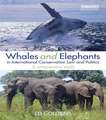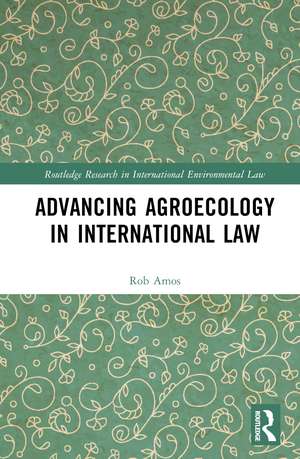Advancing Agroecology in International Law: Routledge Research in International Environmental Law
Autor Rob Amosen Limba Engleză Hardback – 30 oct 2023
| Toate formatele și edițiile | Preț | Express |
|---|---|---|
| Paperback (1) | 311.29 lei 6-8 săpt. | |
| Taylor & Francis Ltd. – 30 ian 2025 | 311.29 lei 6-8 săpt. | |
| Hardback (1) | 936.17 lei 6-8 săpt. | |
| Taylor & Francis – 30 oct 2023 | 936.17 lei 6-8 săpt. |
Din seria Routledge Research in International Environmental Law
-
 Preț: 311.62 lei
Preț: 311.62 lei -
 Preț: 108.70 lei
Preț: 108.70 lei -
 Preț: 325.89 lei
Preț: 325.89 lei - 13%
 Preț: 296.73 lei
Preț: 296.73 lei - 18%
 Preț: 1006.07 lei
Preț: 1006.07 lei -
 Preț: 416.22 lei
Preț: 416.22 lei -
 Preț: 436.14 lei
Preț: 436.14 lei -
 Preț: 389.38 lei
Preț: 389.38 lei -
 Preț: 389.66 lei
Preț: 389.66 lei - 25%
 Preț: 766.65 lei
Preț: 766.65 lei -
 Preț: 329.06 lei
Preț: 329.06 lei - 12%
 Preț: 299.45 lei
Preț: 299.45 lei -
 Preț: 424.16 lei
Preț: 424.16 lei - 12%
 Preț: 299.03 lei
Preț: 299.03 lei -
 Preț: 416.22 lei
Preț: 416.22 lei - 18%
 Preț: 1000.27 lei
Preț: 1000.27 lei -
 Preț: 415.67 lei
Preț: 415.67 lei -
 Preț: 432.29 lei
Preț: 432.29 lei - 17%
 Preț: 270.82 lei
Preț: 270.82 lei -
 Preț: 389.38 lei
Preț: 389.38 lei -
 Preț: 489.26 lei
Preț: 489.26 lei - 19%
 Preț: 246.31 lei
Preț: 246.31 lei - 14%
 Preț: 300.09 lei
Preț: 300.09 lei - 15%
 Preț: 420.20 lei
Preț: 420.20 lei - 8%
 Preț: 326.01 lei
Preț: 326.01 lei - 18%
 Preț: 1067.35 lei
Preț: 1067.35 lei -
 Preț: 461.66 lei
Preț: 461.66 lei - 18%
 Preț: 1054.27 lei
Preț: 1054.27 lei - 16%
 Preț: 262.75 lei
Preț: 262.75 lei - 13%
 Preț: 322.56 lei
Preț: 322.56 lei - 18%
 Preț: 1065.06 lei
Preț: 1065.06 lei - 18%
 Preț: 1065.06 lei
Preț: 1065.06 lei
Preț: 936.17 lei
Preț vechi: 1028.76 lei
-9% Nou
Puncte Express: 1404
Preț estimativ în valută:
179.14€ • 187.42$ • 148.81£
179.14€ • 187.42$ • 148.81£
Carte tipărită la comandă
Livrare economică 02-16 aprilie
Preluare comenzi: 021 569.72.76
Specificații
ISBN-13: 9781032563688
ISBN-10: 1032563680
Pagini: 286
Ilustrații: 2 Tables, black and white
Dimensiuni: 156 x 234 x 18 mm
Greutate: 0.58 kg
Ediția:1
Editura: Taylor & Francis
Colecția Routledge
Seria Routledge Research in International Environmental Law
Locul publicării:Oxford, United Kingdom
ISBN-10: 1032563680
Pagini: 286
Ilustrații: 2 Tables, black and white
Dimensiuni: 156 x 234 x 18 mm
Greutate: 0.58 kg
Ediția:1
Editura: Taylor & Francis
Colecția Routledge
Seria Routledge Research in International Environmental Law
Locul publicării:Oxford, United Kingdom
Public țintă
PostgraduateCuprins
Foreword xii
Preface and Acknowledgements xiv
Table of International Treaties and Agreements xv
PART 1
Protecting Diversity 1
Introduction: Agroecology and the Law 3
Defining Agroecology 5
Locating Agroecology in the Law 8
The Structure of This Book 12
1 Conservation of Agrobiodiversity 14
International Conservation Law and Agriculture 14
The Convention on Biological Diversity 16
The UN Food and Agriculture Organisation 29
Conclusions 33
2 Monocultures and Genetic Diversity 34
The Rise of the Monoculture 34
Invasive/Alien Species and Disease 35
Intellectual Property Rights and Crop Genetic Diversity 39
Protecting Traditional Agricultural Knowledge 50
Conclusions 55
3 Genetically Modified Organisms and Organic Agriculture 56
GMOs in Socioecological Networks 56
Organic Agriculture and GMOs in the Context of Agroecology 57
Responding to the Risks of GMOs 61
Creating Space for GM Crops in Agroecological Networks 74
Conclusions 76
4 Landscapes 78
Defining ‘Landscape’ 78
A Right to Landscape? 80
International Programmes for Landscape Protection 83
Conclusions 90
PART 2
Supporting Socioecological Relationships 91
5 Ecosystem Services 93
Ecosystem Services and Agroecology 93
Ecosystem Services and International Conservation Law 95
Incorporating Ecosystem Services into International Law 99
Conclusions 110
6 Soil Conservation and Land Degradation 112
Soil and Sustainability 112
Soil Conservation in International Law 113
A Soil Treaty? 117
Land Degradation and Desertification 122
Conclusions 129
7 Water Conservation 131
Our Changing Perceptions of Water 131
Natural Water Infrastructure 132
Protecting Freshwater Ecosystems in International Law 135
Aquaculture 143
Conclusions 148
8 Climate Change 150
Agriculture and Climate Change 150
The UN Framework Convention on Climate Change 152
Climate Change Adaptation in Kiribati 154
Conclusions 163
PART 3
Agroecology in a Globalised World 165
9 Environmental Assessment 167
The Origins of Environmental Assessment 167
Defining Environmental Assessment 168
Environmental Assessment in International Law 177
(Re)Introducing Ecology to Environmental Assessment 184
Conclusions 188
10 Transboundary Pollution 189
Agriculture and Pollution 189
Transboundary Air Pollution 191
Persistent Organic Pollutants 199
Unified Approaches to Hazardous Substances and Pollutants 203
Conclusions 207
11 International Trade 209
Neoliberalism and Agroecology 209
Agroecology, Trade and the Environment in the WTO 211
The WTO’s Rules on Agricultural Trade 215
Regulating the Drivers of Zoonotic Disease 221
Conclusions 230
PART 4
Agroecology in Society 231
12 Tracing a Path from Food Security to Food Justice 233
Food (In)Security and International Law 233
Food Security 235
The Right to Food 239
Food Sovereignty 242
Food Justice 246
Conclusions 251
Conclusion: Finding Space for Agroecology 253
Index 263
Preface and Acknowledgements xiv
Table of International Treaties and Agreements xv
PART 1
Protecting Diversity 1
Introduction: Agroecology and the Law 3
Defining Agroecology 5
Locating Agroecology in the Law 8
The Structure of This Book 12
1 Conservation of Agrobiodiversity 14
International Conservation Law and Agriculture 14
The Convention on Biological Diversity 16
The UN Food and Agriculture Organisation 29
Conclusions 33
2 Monocultures and Genetic Diversity 34
The Rise of the Monoculture 34
Invasive/Alien Species and Disease 35
Intellectual Property Rights and Crop Genetic Diversity 39
Protecting Traditional Agricultural Knowledge 50
Conclusions 55
3 Genetically Modified Organisms and Organic Agriculture 56
GMOs in Socioecological Networks 56
Organic Agriculture and GMOs in the Context of Agroecology 57
Responding to the Risks of GMOs 61
Creating Space for GM Crops in Agroecological Networks 74
Conclusions 76
4 Landscapes 78
Defining ‘Landscape’ 78
A Right to Landscape? 80
International Programmes for Landscape Protection 83
Conclusions 90
PART 2
Supporting Socioecological Relationships 91
5 Ecosystem Services 93
Ecosystem Services and Agroecology 93
Ecosystem Services and International Conservation Law 95
Incorporating Ecosystem Services into International Law 99
Conclusions 110
6 Soil Conservation and Land Degradation 112
Soil and Sustainability 112
Soil Conservation in International Law 113
A Soil Treaty? 117
Land Degradation and Desertification 122
Conclusions 129
7 Water Conservation 131
Our Changing Perceptions of Water 131
Natural Water Infrastructure 132
Protecting Freshwater Ecosystems in International Law 135
Aquaculture 143
Conclusions 148
8 Climate Change 150
Agriculture and Climate Change 150
The UN Framework Convention on Climate Change 152
Climate Change Adaptation in Kiribati 154
Conclusions 163
PART 3
Agroecology in a Globalised World 165
9 Environmental Assessment 167
The Origins of Environmental Assessment 167
Defining Environmental Assessment 168
Environmental Assessment in International Law 177
(Re)Introducing Ecology to Environmental Assessment 184
Conclusions 188
10 Transboundary Pollution 189
Agriculture and Pollution 189
Transboundary Air Pollution 191
Persistent Organic Pollutants 199
Unified Approaches to Hazardous Substances and Pollutants 203
Conclusions 207
11 International Trade 209
Neoliberalism and Agroecology 209
Agroecology, Trade and the Environment in the WTO 211
The WTO’s Rules on Agricultural Trade 215
Regulating the Drivers of Zoonotic Disease 221
Conclusions 230
PART 4
Agroecology in Society 231
12 Tracing a Path from Food Security to Food Justice 233
Food (In)Security and International Law 233
Food Security 235
The Right to Food 239
Food Sovereignty 242
Food Justice 246
Conclusions 251
Conclusion: Finding Space for Agroecology 253
Index 263
Notă biografică
Rob Amos is a Lecturer in Law at Greenwich University, UK.
Recenzii
Rob Amos makes an important and timely intervention on the impacts of agriculture on biodiversity at a time of planetary crisis. His creative approach and justification for international law’s facilitation of agroecology recognises the importance of reconceptualising how humans, and law, interact with the environment.
Dr Emily Webster, University of Cambridge (UK)
This is a much-needed work on a hugely important topic. Through carefully selected case studies, Advancing Agroecology in International Law provides a thought-provoking and detailed analysis of the ability of international legal frameworks to support a transition to agroecology. It is essential reading for anyone interested in creating food systems that feed us while also sustaining the planet.
Dr Helena Howe, University of Sussex (UK)
Rob Amos has produced a work of rigorous and measured scholarship on a topic that implicates us all: the deeply-rooted interconnections between global agriculture, the global environment, and international law. His case study on the climate crisis’s impacts on Kiribati is both a cautionary tale and a convincing argument that the agroecology framework can help map a way forward.
Prof. Mehmet Konar-Steenberg, Mitchell Hamline School of Law (Minnesota, USA).
An in depth dive into international law and what this means for agroecology. From clearly defining legal concepts to highlighting conflicting policy goals, Rob Amos's case studies allow us to understand and question how international law may help encourage agroecological systems.
Ellen Fay, Executive Co-Director of the Sustainable Soils Alliance (SSA)
Dr Emily Webster, University of Cambridge (UK)
This is a much-needed work on a hugely important topic. Through carefully selected case studies, Advancing Agroecology in International Law provides a thought-provoking and detailed analysis of the ability of international legal frameworks to support a transition to agroecology. It is essential reading for anyone interested in creating food systems that feed us while also sustaining the planet.
Dr Helena Howe, University of Sussex (UK)
Rob Amos has produced a work of rigorous and measured scholarship on a topic that implicates us all: the deeply-rooted interconnections between global agriculture, the global environment, and international law. His case study on the climate crisis’s impacts on Kiribati is both a cautionary tale and a convincing argument that the agroecology framework can help map a way forward.
Prof. Mehmet Konar-Steenberg, Mitchell Hamline School of Law (Minnesota, USA).
An in depth dive into international law and what this means for agroecology. From clearly defining legal concepts to highlighting conflicting policy goals, Rob Amos's case studies allow us to understand and question how international law may help encourage agroecological systems.
Ellen Fay, Executive Co-Director of the Sustainable Soils Alliance (SSA)
Descriere
Producing enough food is a basic human priority and a critical challenge in the face of a growing population and the deteriorating ecological health of the planet. Modern agricultural practices promise to maximise the productive efficiency of available land but are one of the main drivers of agro- and biodiversity loss.
